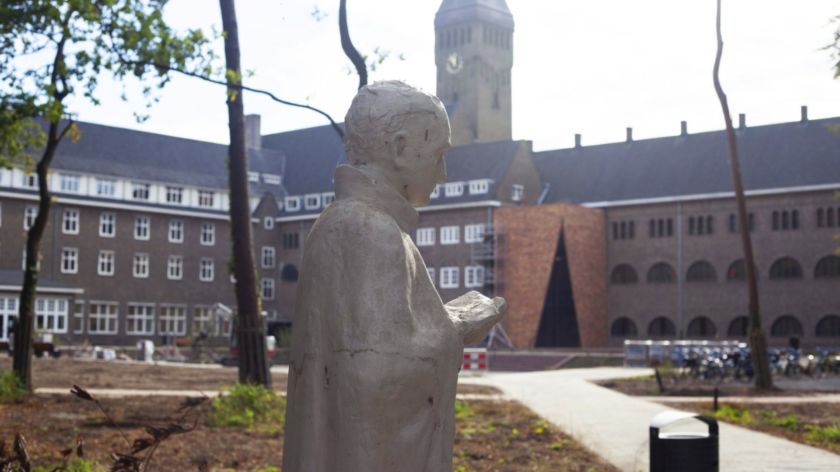Ombudsperson on intimidation rector: ‘Very problematic that this case was kept quiet’
-
 Klooster Berchmanianum. Foto: Nathalie Elenbaas
Klooster Berchmanianum. Foto: Nathalie Elenbaas
Ombudsperson Nancy Viellevoye will not be performing her own investigation into rector Han van Krieken; she has no signals that the rector has repeatedly engaged in sexually transgressive behaviour. However, she is saddened by the fact that the university did not come forward with the information sooner, and of its own volition.
Were you involved with the case surrounding Han van Krieken?
‘No, I’m hearing and reading about it, but I did not play a part.
What are your thoughts on the matter?
‘Let me first state that I think it’s a shame that a number of different cases of transgressive behaviour are all piled up together, despite clear differences in their severity. The behaviour of the psychology professor is definitely worse than the comments made by Han van Krieken, no matter how badly the woman in question was affected by them. But because people are unfamiliar with the details, they make no distinction; I can’t blame them for that.’
Will you be investigating the matter?
‘No, because the matter has already been investigated and settled. In the past year and a half that I’ve worked here, there have been no new reports concerning the Executive Board that warrant an investigation. The case is from 2017; the woman in question made a formal complaint at the time, which was declared valid by the complaints committee. Subsequently, the woman and the university made a deal.’
The Ombudsperson
Barrister and mediator Nancy Viellevoye became Radboud University’s first ombudsperson for employees in 2022. As an independent ‘complaints department’, she can take additional steps: she can advise complainants; mediate between employees; push for investigations with faculty boards or even the Executive Board; she can even start her own investigation. According to her first annual report, in most cases – 77 per cent– giving advice is sufficient.
By that you mean the settlement agreement? What does such a document entail?
‘A settlement agreement is a deal made when the parties involved can’t come to an agreement themselves. Obviously, it is preferable when talks or mediation help both parties to move on, or for the university to find a different position for the employee in question. But if those attempts fail, a settlement agreement is the next step: it means the employee receives a lump sum and their contract is terminated.’
Is a nondisclosure agreement common in that sort of thing?
‘Yes, that’s fairly standard when it comes to settlement agreements. These state that neither party will publicly discuss the incident, nor will they negatively comment on each other.’
And what if one of the parties involved does not hold up their end of the agreement? Do they get fined? The woman first asked the Supervisory Board if she was allowed to tell her story.
‘In theory, the University could reclaim the money if the woman did not stick to the agreement. However, the Supervisory Board did grant her permission to make the matter public.’
Do you know what comments were made by the rector?
‘Yes, and let me be clear: obviously, he never should have made them. It is always regrettable when someone feels a comment crosses a line. He should have apologised immediately. But on the other hand, we now live in an era where everything is judged harshly and immediately; it’s a blame culture. I don’t mean to belittle the case, and of course someone should be corrected when they make a mistake, but you do need to be able to talk to each other afterwards. As a society and as a university, we have to get along.’
What is your opinion on the handling of the case?
‘It saddens me that both parties were unable to come to terms, and that the conversations were apparently unsatisfactory. There were no winners in this case.’
How would you handle this case, were it presented to you now?
‘If someone made a report to me about a member of the Executive Board, I would discuss it with them and the Supervisory Board. I would try to find out the exact severity of transgressive behaviour. If there was an actual offense or a serious transgression, that changes things. Otherwise, I would have the rector and the woman discuss the matter; if necessary, I would supervise. There would need to be a sincere apology, and I would ask the woman what she needs in order to move on. It is always preferable to solve these issues among the people involved. An official complaints procedure takes a lot out of people; it’s a complicated legal process that can be damaging in its own right.’
Would you advise them to make the case public?
‘Yes, if the woman felt that this would help her healing process. But in that case, it should happen immediately, not years later. I find it very worrisome that the boards at the time kept the case quiet; the official complaint was left out of the 2018 yearly report. They dodged the story at the time, and now it came back like a boomerang. I’ve said before that institutions like the university benefit from transparency, and both the Executive Board and the Supervisory Board need to be much more ware of this; it now seems as though these cases are hushed up.’
How do you explain that six years later, the woman is still troubled by the rector’s comments?
‘That is a question only she can truly answer, but it might have to do with a sense of injustice; the rector kept his position, while she lost hers.’
Can anything still be fixed?
‘I’d say give it a try. Ask the woman what she needs to put this behind her. It should help that the rector made a public apology.’
Lately, cases of transgressive behaviour keep popping up at Radboud University. There was a case at the philosophy faculty; one involving an employee at the Artificial Intelligence programme; the case of the psychology professor, and now the rector. Do you think it will ever stop?
‘These are mainly cases from the past; I hope it means we’re cleaning house. I hope that we will soon be able to say: that was a rough period, but we learned our lesson.’
This article was translated by Jasper Pesch.




